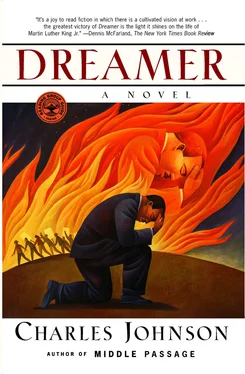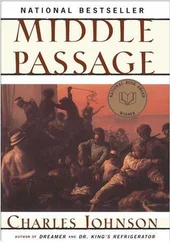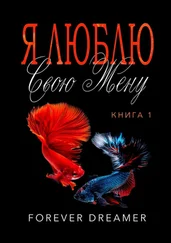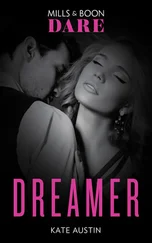Inside a tiny kitchen behind the main room, Smith began to unravel. I should have seen it coming. I should have known. When the magnitude of what the minister asked us to do finally dawned on him, when he was at last standing at the door of his first real performance as a double, Smith collapsed heavily onto a wooden folding chair and began mopping his forehead with a handkerchief. His breathing was ragged, asthmatic. Suddenly he began hiccuping uncontrollably, almost strangling, and looked helplessly toward Amy. I knew she was thinking the same as me. It was over. He was ready for riding in decoy cars, for drawing fire away from King, but not for standing before an audience of over five hundred of the genuinely faithful … He was going to crash and burn, as he’d always done in the Citivas Dei. Blow this operation wide open. Fall on his face and embarrass us all. Or worse, pass out right there in the kitchen in front of Calvary AME’s ushers and clergy.
“Is something wrong?” Rev. Coleman asked.
Amy eased herself between the pastor and Smith. “Give us a few minutes alone, okay? He just needs to compose himself before he gets his cue.”
Reluctantly Rev. Coleman cleared the kitchen, leaving Amy and Smith to themselves.
I left through a side door and joined the congregation, taking a spot to the right of the pulpit. I scanned the crowd, my eyes tracking packed wooden pews in the northeast corner to the laity filling the seats and aisles in front of me, men in their best (and only) dark suits brought out from the back of their closets every Sunday or for occasions such as this, their brogans shined and buffed the night before, cooling themselves with fans provided on the back of each bench, their wives, bearing names such as Adella, Inell, and Luberta, sitting quietly beside them in light cotton dresses, some wearing gloves despite the heat of bodies packed so close together on the benches, perspiration just beginning to bead on their foreheads, dampening at the root oil-heavy hairdos subjected earlier in the day to the straightening comb; I picked out Robert Jackson, a dignified, immaculately dressed, balding Negro sitting on the bench he bought at Calvary, then to his right another old man in a rimpled K-Mart suit, holding a wide-brimmed hat on his lap. My eyes moved up, up above them, to a triptych of stained-glass windows on the western wall, one depicting an alb-clad Jesus standing before Herod’s jeering soldiers in the praetorium, another showing Jesus during his lonely vigil of fasting in the desert, the large middle painting portraying a mob hanging him from the cross, and though I knew I was supposed to be watching the crowd, scanning the room every few seconds, my eyes never resting anywhere for long because who knew where an assassin might appear, the feeling that always flooded through me when I entered Negro churches came over me again — the sense, right or wrong, that for the briefest of moments I was safe from the ravages, the irreality, the racial stupidities of the world outside Calvary’s doors, that no harm could befall anyone here where so much of value was preserved, meaning made manifest in the minutest details by black people who came to this place, sacred and set off from the chaos of the streets outside, to find husbands and wives, to baptize their children, and to bury their dead before gathering at the home of the deceased, sharing memories of her with the survivors, and being fed by her friends and neighbors who filled the kitchen table with food as a reminder that the bereaved must take nourishment, no matter if they were hungry or not, and walk on, and know that death was not final, because Jesus conquered that once and for all, so yes, eat and be joyful even in mourning because no Christian should forget the good news of the gospel, and no believer in Him ever feel alone or have cause for despair. From my childhood came a verse, Nevermore thou needest seek Me / I am with thee everywhere: / Raise the stone and thou shalt find Me / Cleave the wood and I am there . This was what Calvary’s congregation believed. What I had been taught from the time I could walk. Religion (Latin religare, “to bind,” or bring together those things broken, torn asunder). But was all this, I wondered, an illusion? Badly I wanted to believe, as they did. Behind me I heard twenty teenage girls in white blouses and black skirts blending their voices in the opening hymn, “Amazing Grace,” wringing that song out so thoroughly it outstripped anything on WVON’s “Top Forty.” An old woman who favored Helen Martin about the face stroked the keys of an ancient piano, and while I did not know if her faith was ill-founded, I did know it was here — and only here, in the Negro church, for the last hundred years — that black people pooled their money in order to send the congregation’s best students on to train at schools like Morehouse and Fisk; here that teachers selflessly used their weekends and nights to tutor children and conduct Sunday-school classes that, beginning with the Bible, branched out forward and back in the better seminars to examine the preconditions for Christianity and all the intellectual and scientific traditions it had influenced from Tertullian to quantum physics; here that a young Romare Bearden encountered the cornucopia of styles and forms — in spirituals, hymns, prayers, and sermons — that opened him to the epic dialogue that was art; and here, finally, that the civil rights movement was nurtured and sustained, prayer and racial politics inseparably melded by clergy, stewards, and trustees who, if they knew nothing else, understood that they served their people best by reminding them again and again that their political and racial struggles were but the backdrop against which a far greater spiritual odyssey was unfolding, and that no worldly triumph deserved hallelujahs if in their secular victories they somehow lost their souls.
At Calvary’s crowded entrance I saw the Wise Guys.
There were two of them, one a hairless, pursy, middle-aged little man in horn-rimmed glasses, slow-moving as a turtle, his belly bubbling over his belt. The other was Titian-haired, thin, in his twenties, his profile made birdlike by a hawkbill nose, carrying a notepad he scribbled on in shorthand, never looking down at the page. They looked tired; they kept shifting their weight from one leg to the other, as if maybe their feet hurt. In another context they might have been Mormons working a neighborhood, tramping from door to door. These were the ones who followed us from the West Side, whom I’d seen on the road in rural Illinois, and who now no doubt were taking down names. They looked intensely interested when the audience rose to its feet and erupted into clapping and cheers.
Amy walked in behind King — it most certainly was King, not Chaym Smith — from the kitchen to a row of seats on the stage. I had no idea how the minister had gotten here at the last minute, but I muttered thanks to the Almighty, for the prayer I’d made had come to pass, and I released my breath, which I felt I’d been holding for hours.
And then the audience settled down. Whether the minister knew it or not, his physical presence, while not imposing, brought a hush like soft background music, or as if someone cracked a window in a crowded, smoke-filled room. I felt something in him sorely lacking in myself — grace or a spiritual wealth so great he could give of himself endlessly, and always there was twelve basketfuls left over, as one might dip a cup into the sea and never see it emptied. He was an old soul. Centuries old. Not putting on a show, he stopped all conversation and commanded respect; not justifying himself, he was distinguished; not boasting, he was instantly acknowledged. Standing beside Rev. Coleman at the forest of black microphones on the pulpit, with flashbulbs exploding like fireworks in the hands of the Associated Press and British newsmen who rushed to the front of the church, he was august, hugely present, relaxed, munificent, established in mercy, but at his center I felt a cemetery — a coolness and crypt — in which all regard for himself and his safety lay buried. Something in him was dead, extinguished so long ago during the Montgomery boycott when he was hardly more than a boy that it no longer even existed in memory In some way that I could not coax into clarity, his very presence challenged me and commented, without his having yet said a word, on my own staggering shortcomings as a man, a Negro, a Christian. The level he was living on did that. No newspaper article or television interview touched what I felt that evening. To engage him at all, this preacher who dared to say, “There will be no permanent end to the race problem until oppressed men develop the capacity to love their enemies,” who quoted Epictetus, Keats, Emerson, and Dunbar as if they were his first cousins — to meet him face-to-face, I realized, forced a man to kick up his own thoughts and feelings a notch or two, as you might when going one-on-one with the finest athletes on a playing field, so that even mediocre men like me rose momentarily to finer planes of performance.
Читать дальше












